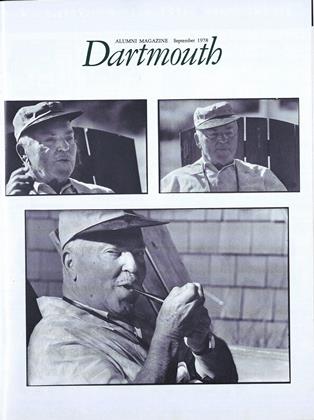With the fiscal year coming to a close, the branch managers were brought in to the home office to report on progress and procedures, to share a few grievances, to study growth projections, and to hear pep talks from the company brass.
Not an unusual scenario, to be sure. Except when the home office is Hanover, the business the Campaign for Dartmouth, and the product the need for funds to maintain the quality without which, in President Kemeny's words, "there is no purpose in having a Dartmouth."
The College, like many other institutions in the heat of a capital gifts campaign and a few on a permanent basis, has established five regional offices for the duration of the drive, mainly to provide staff and organizational support for the volunteers who will be soliciting "leadership gifts," ranging from a few thousand to $100,000. Presiding-over the offices are six men and women, of whom a lot of alumni will be seeing a great deal as the months roll by. They are a true green lot - four alumni and two former College officers; five of them are quite young, and one is not quite as young.
Clockwise from Hanover: Laurence Duffy '65 is in charge of the Boston office, which serves the New England area down to a nebulous line separating it from New York suburbia; Hugh Dryfoos '40 is assisted by Katharine Welling, former director of Dartmouth's career counseling services, in New York, coordinating areas to the west and south as far as Washington; Virginia Soule Norton, who has been an assistant director of admissions and an assistant dean of freshmen, is our woman in Atlanta; Sandra Helve '76, Tuck '77, runs the San Francisco office; and Malcolm Jones '7l is the regional director in Chicago, with the entire midwest as his territory.
It's a sobering figure, the $160 million the College has committed itself to raise within five years. By one reckoning, it averages $4,000 per alumnus. It also "comes to $100,000 a day, not counting Sundays," Vice President Addison Winship '42, the campaign director, reminded his field lieutenants in a briefing session. "It would be nice if one of us could find a check for $100,000 in the mail each day, but the world doesn't work that way and we're all going to have to work for it.'
At mid-June the campaign was right on target, Winship told them, adding that "we're delighted - all we hear and see and feel is good" about the way the regional offices are functioning. With the first interim goal of $40 million met slightly ahead of schedule, he predicted that "Year Two should be the most productive of the campaign." Without the initial impetus of the $24 million that was already in hand or pledged before the start of the drive, he warned, the going would get tougher. "We're now out in new territory, but we hope to keep the momentum going and do at least as well during the next year."
Acknowledging the fact that the real challenge is major gifts ($100,000 and above) and leadership gifts, Winship emphasized that "we must avoid the notion that this is just another capital gifts campaign for rich people." The quality of the campaign should match the quality of the College, he said, and the effort should be to reach everybody. "Your signal should say, 'Give in every way - through the Alumni Fund, reunion giving, the capital campaign - each according to means and caring. The Third Century Fund, he commented, had only 8,000 donors, three-fourths of them at levels under $1,000.
Winship fielded questions from around the table: "Do contributions to club scholarship funds count?" - "Yes, all gifts to all existing programs are figured in the campaign." - "Why didn't the Boston and Chicago kick-offs get as much coverage as the New York dinner? We felt slighted." - "Because that's the way the Magazine did it." - "How do you answer people who are unhappy with the Admissions office?" - "That's a problem that's been around so long, I don't even recognize the question." - "How do you clear up the relationships between class campaign coordinators, head agents, and area committeemen." - "The best you can. We'll never have all the answers. Fund raising is a very imprecise, very imperfect business. We're trying to do it all at once - the fund, reunion giving, the campaign - and it's never been done before."
Then the regional directors got down to procedural and housekeeping details with their immediate superior in Hanover, Michael Choukas '51, director for leadership gifts, and Francis Fenn '37, vice chairman for leadership gifts and roving adviser. Himself a volunteer, Fenn is criss-crossing the country, working with the regional directors in setting up alumni committees in the multiple areas each has under his or her jurisdiction.
And that was only the first afternoon of a full week's briefing, during which the branch managers met with just about everybody who is anybody at the home office, including President Kemeny, who invited them in to lunch. Then they went back to the comparative quiet of their own offices. You'll be hearing from them.
 View Full Issue
View Full Issue
More From This Issue
-
 Feature
FeatureA Company of Stretchers
September 1978 By Cay Wieboldt -
 Feature
FeaturePoet at Full Ahead
September 1978 By Charles G. Bolte -
 Feature
FeatureTHE RIVER and THE DAMS
September 1978 -
 Article
ArticleA Journey: Five days to Big Rapids
September 1978 By Dan Nelson -
 Article
ArticleDickey-Lincoln: Who wants it? Who needs it?
September 1978 By Greg Hines -
 Article
Article'A Spirit of Fire and Air'
September 1978 By NARDI REEDER CAMPION







